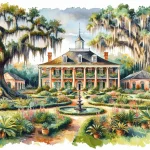Situated along the meandering Mississippi River, the historic plantations of New Orleans offer a captivating look into the region’s intricate and multifaceted history. These grand estates, once the centers of the South’s antebellum economy, now stand as living museums, inviting visitors to explore the narratives etched into their very foundations.
In This Article
TL;DR
- Plantation tours provide an immersive experience into the historical significance of these sites, shedding light on the harsh realities of slavery and the lavish lifestyles of the plantation elite.
- A variety of tour options cater to diverse interests and educational goals, including guided tours led by knowledgeable docents and self-guided explorations.
- When choosing a plantation tour, factors such as duration, cost, and thematic focus should be considered to ensure a meaningful and enriching experience.
Historical Context of New Orleans Plantations
The plantations of New Orleans played a pivotal role in shaping the economic and social fabric of the pre-Civil War South. These sprawling estates, built on the labor of enslaved Africans, were the driving force behind the region’s lucrative sugar and cotton industries. As wealth and power concentrated in the hands of the plantation elite, a stark contrast emerged between the opulent lifestyles of the owners and the brutal conditions endured by the enslaved workers.
In the aftermath of the Civil War and the abolition of slavery, many plantations fell into disrepair, their once-thriving fields lying fallow. However, a handful of these historic sites have been meticulously preserved, offering a tangible connection to this complex chapter in American history.
Overview of Popular Plantation Tours
New Orleans and its surrounding areas boast a wealth of plantation tours, each offering a unique perspective on this era. From the stately Oak Alley Plantation, with its iconic double row of live oak trees, to the Whitney Plantation, which focuses on the narratives of the enslaved, these tours provide an in-depth exploration of the region’s past.
Guided tours, led by knowledgeable docents, offer an in-depth look at the plantations’ architecture, daily life, and the stories of those who lived and worked there. Self-guided tours allow visitors to explore at their own pace, while special event tours, such as candlelight tours or reenactments, provide an immersive experience that transports visitors back in time.
Educational Value of Plantation Tours
Plantation tours serve as powerful educational tools, shedding light on the harsh realities of slavery and the complex social dynamics of the antebellum South. Through reenactments, exhibits, and preserved artifacts, these tours bring history to life, allowing visitors to gain a deeper understanding of this pivotal era.
By exploring the narratives of the enslaved, visitors are confronted with the inhumane conditions and systemic oppression that defined the lives of countless individuals. This understanding is crucial in fostering a more comprehensive and nuanced perspective on the nation’s history, promoting empathy and cultural awareness.
Cultural Significance
The plantations of New Orleans have left an indelible mark on the region’s cultural landscape. Their architectural grandeur, influenced by French, Spanish, and Caribbean styles, has inspired generations of architects and designers. The plantation culture has also shaped Southern cuisine, with its rich flavors and traditions rooted in the ingenuity of enslaved cooks.
Moreover, these plantations have been immortalized in literature and film, shaping perceptions of the American South and serving as backdrops for stories that explore themes of identity, resilience, and the enduring legacy of slavery.
Visitor Experience
A plantation tour in New Orleans typically begins with a journey through the lush, verdant landscapes that surround these historic sites. Upon arrival, visitors are greeted by the imposing grandeur of the plantation homes, their columns and intricate details a testament to the wealth and status of their former owners.
Guided tours often last between one and two hours, with knowledgeable docents leading visitors through the meticulously preserved interiors, sharing stories of the families who once called these estates home. Visitors can expect to learn about the daily routines, social customs, and architectural elements that defined plantation life.
Ethical Considerations
While plantation tours offer a valuable educational experience, they have also been the subject of controversy and ethical debates. Critics argue that presenting these sites as tourist attractions may inadvertently romanticize or whitewash the harsh realities of slavery and exploitation.
Responsible tour operators strive to present a balanced and respectful narrative, acknowledging the suffering endured by the enslaved while also honoring their resilience and contributions to the region’s history. By fostering open dialogue and encouraging critical thinking, these tours can serve as catalysts for deeper conversations about race, inequality, and the ongoing pursuit of social justice.
Community and Economic Impact
Plantation tours play a significant role in the local economy, generating tourism revenue and creating employment opportunities for residents. Many tour operators prioritize community involvement, collaborating with local historians and cultural organizations to ensure accurate and authentic representations of the region’s history.
Furthermore, a portion of the revenue generated by these tours is often reinvested into preservation efforts, ensuring that these historic sites are maintained for future generations. This not only safeguards the physical structures but also preserves the stories and narratives that are woven into the fabric of these plantations.
Future of Plantation Tours
As societal attitudes and perspectives continue to evolve, the presentation and management of plantation tours are likely to adapt as well. Innovations such as virtual tours or augmented reality experiences may offer new ways to engage with these historic sites, while addressing accessibility concerns and reaching broader audiences.
However, challenges remain, including environmental concerns and ongoing debates surrounding historical accuracy and representation. By embracing open dialogue, fostering inclusivity, and prioritizing educational value, plantation tours can continue to play a vital role in preserving and sharing the complex narratives that have shaped the region’s identity.






